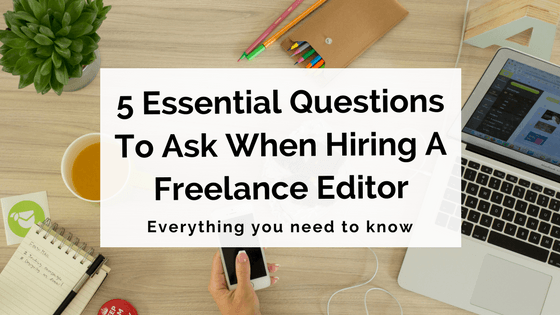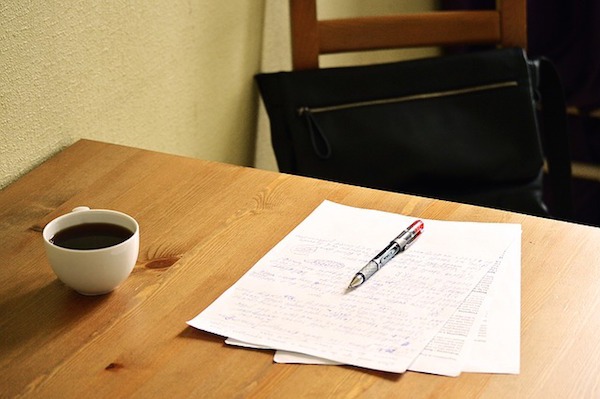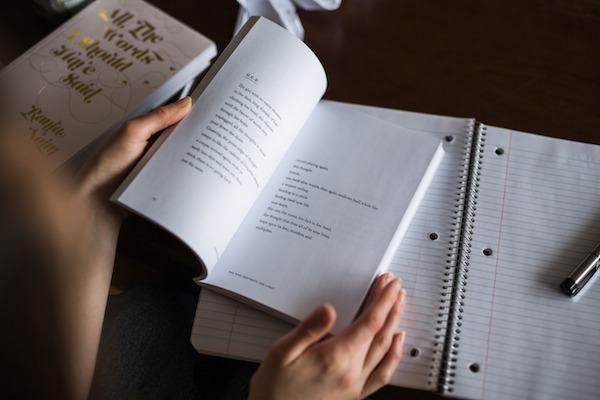Picture this: you’ve just got your hands on the first proof of your self-published novel, and it’s everything you could’ve hoped for. The binding: superb. The cover: sublime! And the paper stock? Magnifique! Nothing could ruin this moment!
Now imagine that you carefully open your book on a random page… and immediately spot six typos, a comma splice, and an unnecessary line break. Moment ruined.
Nobody wants to print a book to discover that it needs more polish. But when you’re so close to a writing project, it’s easy to overlook its problems. That’s why you need professional help: you need a freelance editor! But don’t flex those Googling fingers just yet: here are five essential questions you need to ask first.

1. Where do I start my search?
The Internet is always a good place to begin looking, but there’s a catch: you need to separate the serious editors from the people looking to make a quick buck.
With a website like Freelancer.com, you can approach editors directly, or post your project and let them come to you. This is a legitimate platform used by reputable companies like IBM and LEGO, but beware: anybody can sign up for free and start working. That’s not to say that you can’t get good editors there, but you may have to go through less qualified candidates to find them.
If you want quality, contact your local editing society:
- For Australians, there’s the Institute of Professional Editors (IPEd), which has branches in all but one state and a member directory on its website.
- For our American pals, there’s the Editorial Freelancers Association (EFA), which also offers a searchable directory.
- UK friends, try the Society for Editors and Proofreaders (SfEP) – it also has an online directory.
Outside these formal societies are collectives like the Freelance Editors’ Network: they’re not officially organised, but they still put you in touch with some very experienced editors.
And don’t forget word of mouth! The writing and self-publishing community is huge; there’s a good chance you know someone who knows a fantastic editor. And if you don’t, then don’t be afraid to reach out on social media! It’s a small world, after all.

2. Who is the best freelance editor for me?
If you’ve been browsing a list or directory, check out the editors’ bios and portfolios. If you got names through word of mouth, or just want to dig deeper, Google them to see if they have a website, blog or LinkedIn account that mentions their work.
These are all good preliminary steps, but don’t make any decisions yet: your prospective editor might look good on paper (or screen), but you need to make sure they’re the right fit for you.
Pick up that phone or type out an email (as writing buffs, this might be the preferred method for you both)! This is the best and most direct way to learn about their services.
It’s also your chance to suss out their knowledge, experience, professionalism… and personality! The editing process is all about communication, so you should at least like your editor, or working with them could be awkward.

What should I ask a prospective editor?
- If they have any qualifications or memberships. You might prefer someone with the theoretical grounding of a degree or certificate, or someone who upholds the standards of an editing society.
- If they have experience or a portfolio. Do you want the seasoned veteran who’s been in the game for twenty plus years, or the enthusiastic novice who’s just starting out?
- How and what they charge. See below for more on this.
- What systems they use to edit. Are they on a Mac or a PC? Do they prefer MS Word, Adobe Acrobat or InDesign (or hard copy)? Be sure that your systems are compatible.
- If they respond quickly to enquiries. As we said, editing is all about communication, so make sure they’ll give you the time of day rather than ignore your email for a week.
- If they seem honest and respectful. You want your editor to be upfront, but not insensitive. There’s a difference between telling someone that their writing needs improvement and telling them that it’s garbage.
- If they genuinely appreciate the story you have to tell. Editors who believe in your writing will be more committed to its success, and will thus be more likely to go the extra mile on your behalf.
- If they respect the boundaries between author and editor. At the end of the day, it’s your work: will they give you the final word, or will they try to steamroll you based on what they think is right?
- If they know what they’re talking about! Do they know what a style guide is? Can they justify their editorial decisions? Or are you the one having to explain the difference between en and em dashes?
Bear in mind that the right editor for you may not tick every single box. A recent graduate may not have much experience, but they could still be highly professional and demonstrate fantastic editorial skills.
Just be wary of making too many concessions; it’s one thing to lack a portfolio, and another to lack any business sense.

What about pricing?
Editorial rates vary greatly depending on a number of factors: the editor’s experience, the speed at which they work, the extent of work required, how soon your deadline is, even who you are (some editors offer discounts to students, for example).
There are also differences in the ways rates are calculated: by word count, by page count, by hour, or by fixed project fee. This makes it hard to draw comparisons between any two editors. For example:
- The EFA recommends charging US$30–100 per hour
- The SfEP advises £23.35–33.80 per hour
- Australian editors take anywhere between AU$45–215 per hour (as of 2011)
Feeling a bit boggled by the range of figures? You’re not the only one. Our advice is to go directly to the editor you want to hire and ask for a quote that’s tailored to your individual needs.
Be wary of inflexibility, but don’t drive too hard a bargain, either; nobody is obligated to take your money. Instead, look for the option that’s fairest and most reasonable for both parties.
If all else fails and you can’t bring yourself to play Twenty Questions, make sure you ask at least one: will the editor undertake a sample edit? Give them a small portion of your writing – a couple of pages, or a short chapter – as a test run.
Some editors will agree to do this free of charge, and some will ask for compensation. By the end of it, though, you’ll have a much better idea of how they work (with your material), and whether you like them.

3. What kind of editing services do I need?
Editors may be talented, but they’re not mind readers: they need to know what they’re being paid to do, so they can work realistically within that budget. In return, you need to make your expectations crystal clear, and in order to do that you need to know what to ask for.
Broadly speaking, editorial tasks fall into one of three categories. The terminology sometimes differs, but the definitions are generally understood; for our purposes, we’ll be using the terms established in Snooks & Co.’s Style Manual (Sixth Edition). They are:
- Substantive or structural editing. An in-depth assessment of content, structure, language and presentation.
- Copy editing. A narrower focus on language, including accuracy/consistency, vocabulary, grammar, spelling and punctuation.
- The penultimate check for completeness and discrepancies before printing.
A comprehensive edit will encompass all of these things, but you can also pick and choose. You might, for example, want an editor to take care of structural and copy editing, then employ a separate proofreader (the more eyes, the merrier).
Just remember that more services necessitate more time and money, so take a good, hard, honest look at your manuscript before you make a decision.
What if you’ve got no idea what your manuscript really needs? That’s what the aforementioned sample edit is for. Ask your chosen editor for their opinion or recommendation before they begin; they’ll be able to tell you how much work is needed.
On that note, make sure that you both agree on the scope of work to be completed. Don’t ask for a copy edit while secretly expecting a structural edit, too. If you want more (or less), just say so: it’s always possible to renegotiate if you’ve got the time and money to do so!

4. When should I set my deadline?
First and foremost, consider your own needs. Whether you have a printing or crowdfunding deadline to meet, or are determined to launch your book on a certain date, you need to let your editor know about it.
Once you’ve done that, consider their needs. Freelancers have deadlines, too – they may have multiple projects on the go, or other jobs lined up in the near future. As much as you want them to fit into your schedule, you need to consider theirs, too.
In addition to your respective schedules, the biggest deadline variables are:
- The amount of time editing will actually take. Low word and page counts, a single round of editing, and a less comprehensive service will naturally take less time than bigger and more complex jobs.
- The amount of time your review will take. Changes don’t incorporate themselves; you need to set aside time to read them, comprehend them, query them, and apply them. You may also deem it necessary to meet in person, so budget for meetings.
The process may seem endless, but stay calm! If you provide an accurate word or page count at the outset of the job (and refrain from increasing it), your editor will be able to estimate the length of time they’ll need.
It’s also advisable to keep communication flowing throughout the process: organise a weekly check-in via email or phone call. This keeps both parties in the loop and enables you to track and update your overall timetable.
What if you’ve got your heart set on a particular editor, but they can’t deliver in the timeframe you want? As disappointing as it is, you can breathe a sigh of relief that they were honest – an overcommitted freelancer may not be able to give you their best work.
Luckily, freelancers are many and their community is tight-knit. Ask your preferred editor for a referral – they may have talented colleagues they’d be happy to recommend. And if they’re anything like your first choice, you know you’ll be in good hands!

5. Why should I hire a freelance editor at all?
Let’s be honest: hiring a freelance editor is a huge investment. For a self-published author with scarce resources, it may even seem like a luxury. There’s probably a part of you that’s wondered if it’s worth it.
Well, ask yourself: have you ever overlooked something painfully obvious? Ever overlooked something right under your nose? Ever wondered how you could have missed something that somebody else pointed out?
Working with a freelance editor is a little like that. No matter how well we write, we are all susceptible to mistakes and can easily overlook them in our excitement.
Freelance editors don’t have an existing emotional attachment to your writing. That’s not to say that they can’t care about it – on the contrary, they may come to believe very passionately in it – but they certainly won’t be looking at it through rose-coloured glasses.
Receiving honest feedback has obvious benefits for your writing: fewer errors and inconsistencies/inaccuracies, tighter overall structure, better flow and presentation… What we’re getting at here is quality control and polish.

You should also remember that a freelance editor is the mediator between you and your readers (not to be confused with the equally important beta reader). What tumbles from your imagination doesn’t always translate into someone else’s comprehension. But editors are very good at connecting the dots. Get one on your side, and your story will become much more reader-friendly.
Finally, freelance editors don’t just advocate for readers – they also advocate for writers! You can learn a lot about your own technique and style by listening to their feedback and corrections. They may flag issues you’ve never noticed, or offer solutions to problems that would never have crossed your mind.
Remember that editorial feedback is not gospel: suggestions are exactly that. It’s up to you to decide whether to apply them or not. And it’s okay to disagree from time to time – better to reject a change after establishing its impact, than to blindly accept it without considering its effect.
You’ll end up being better informed as a writer, and that’s perhaps the number one benefit of working with an editor.

***
Hiring a freelancer can be daunting. Our stories are our babies – why would we entrust them to a stranger? But despite the hand-wringing and mild embarrassment that ensues from outside judgement, it’s completely worthwhile.
Like the Mary Poppins of manuscripts, your editor will whip your manuscript into shape, and when you part ways you’ll wonder what you ever did before they arrived on your doorstep.
Have you ever worked with a freelance editor? What was your experience like? Let us know in the comments! And if you’re interested in editing yourself, check out our guide to getting started as a freelance editor.